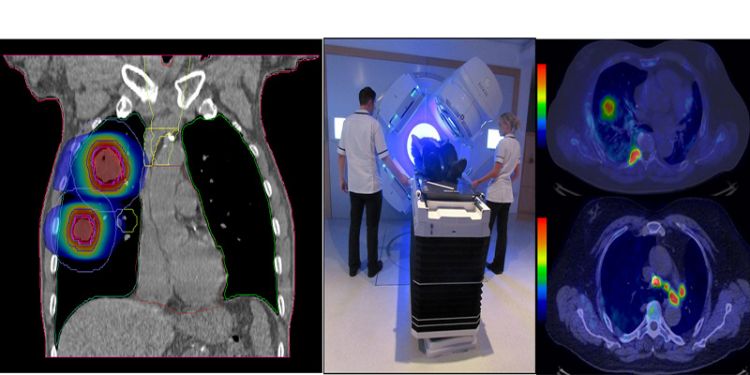The Radiotherapy Research Group
- Group summary: We deliver internationally leading, patient focused, radiotherapy research that improves cancer outcomes and reduces side effects. We are a multidisciplinary research team with expertise ranging from pre-clinical radiation biology through to phase III clinical trials. Tumour site interests include gastrointestinal, brain, urological and lung cancers.

What we do
Our group was assessed as an UK Emerging Centre of Excellence for Radiotherapy Research in 2016 by the Clinical and Translational Radiotherapy Research Working Group. We have also recently secured £3.5 million from Cancer Research UK to fund advances in radiotherapy research as a RadNet Leeds centre, focusing on the use of artificial intelligence with imaging technology. Our areas of scientific interest include:
- Preclinical radiotherapy: Professor Short leads a consortium of researchers focused on discovery science and pre-clinical radiotherapy applied to glioma and brain metastases. This group focuses on assessing novel drug-radiation combinations and interrogating the effect of radiation on tumour models and the microenvironment. This work is supported a range of funders including The Brain Tumour Charity, MRC and CRUK.
- Precision radiotherapy and brachytherapy: We focus on optimising radiotherapy delivery using Intensity Modulated Radiotherapy, Stereotactic Ablative Radiotherapy and MRI guided radiotherapy.
- Clinical trials: We lead a portfolio of radiotherapy clinical trials, including novel agent combinations. These include Gastrointestinal Cancer (Sebag-Montefiore and Appelt), Brain Cancer (Short and Murray), Lung (Franks) and Urological cancers (Henry). We work closely with Leeds Clinical Trial Unit.
- Radiotherapy Imaging: Professor Andy Scarsbrook, Professor David Buckley and Dr Stuart Currie lead multi-modality cancer imaging and neuroradiology research respectively. They use of advanced imaging techniques based on MRI and PET-CT imaging to predict outcome and monitoring early response to therapy.
- Re-irradiation: Dr Louise Murray and Dr Ane Appelt lead research to optimise the delivery of re-irradiation across a range of tumour sites including the brain and pelvis.
- Radiation toxicity and big data: We have the expertise in the application of electronic methods of collecting Patient Reported Outcomes (PROMS) to measure radiotherapy toxicity. We discover and translate biomarkers to improve treatment selection and delivery into the clinic through clinical trial and distributed learning analysis.
- Developing future leaders: Our multi-disciplinary group provides an excellent environment for under-graduate and post-graduate research. We develop future leaders through an established and successful pathway for career development.
Radiotherapy Research Seminars at St James's
To view a comprehensive list of our upcoming and previous research seminars visit our seminar page.
Publications
Key publications our team has contributed to:
- Results from the largest anal cancer phase III trial
- Intravenous reovirus delivery into brain tumours underpinning the Leeds led CRUK ReoVirus trial
- Highly research active institutions obtain better outcomes for their patients
- Development of new agent radiotherapy combinations
Funding
Our group is funded by a range of sources including:
- Cancer Research UK
- Yorkshire Cancer Research
- the National Institute of Health Research,
- Medical Research Council
- Welcome Trust
- local charities including Leeds Cares.
Examples of 5 year duration “programmatic” level funding include:
- Cancer Research UK - ART NET – Advanced Radiotherapy Technologies Network – Accelerator Award linking Leeds with four other radiotherapy centres in the UK. Read more here.
- Cancer Research UK - Clinical Trial Unit infrastructure funding- From Oct 2018 for five years to develop a clinical trial portfolio including new agent combinations and new radiotherapy technology. Read more here.
- Yorkshire Cancer Research - Yorkshire Cancer Improvement Programme. Read more here.
- Brain Tumour Charity - Leeds centre for translational neuro-oncology programme. Read more here.
- Brain Tumour Charity - Tessa Jowell BRAIN-MATRIX. Read more here.
Studentships
We attempt to match the best candidates with the best studentships. Several competitive schemes are available for three-four year PhD studentships (MRC, YCR, CRUK, NIHR etc). Please see the FindAPhD website or the Faculty Graduate School pages for postgraduate research opportunities and projects in the laboratory.
Self-funded students: International or domestic self-funded or scholarship/fellowship PhD students are welcome to apply for a place in the laboratory or clinic.
You must be in possession of either an upper second or first class honours degree from an internationally renowned University. International students must meet requirements for written and spoken English set out by the Graduate School. Bench fees are required if you are self-funded.
Please email Ann Henry or Katherine O'Mahony for informal enquiries.
Who we are
Professor David Sebag-Montefiore - Group lead
Latest news
Leeds scientists lead next generation of radiotherapy treatment
Revolutionising radiotherapy: making a cornerstone cancer treatment more personal and powerful
Related links
University of Leeds Cancer research

